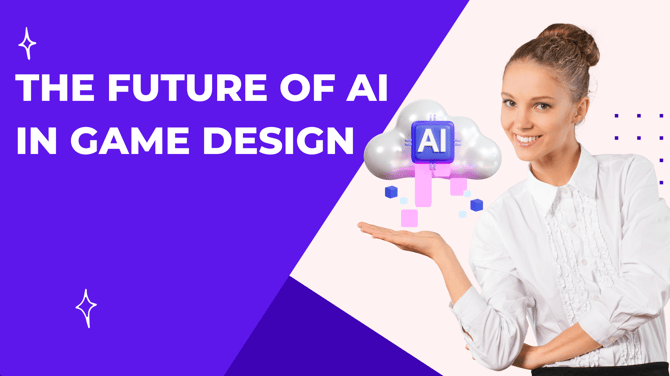The Future of AI in Game Design: OpenAI's Role
This article delves into the growing influence of artificial intelligence (AI) in the field of game design, with a specific emphasis on OpenAI's significant contributions. It explores how AI is reshaping the gaming industry, improving game development processes, creating dynamic in-game experiences, and optimizing gameplay.

Artificial Intelligence (AI) has been a game-changer in various industries, and the world of game design is no exception. Over the years, AI has evolved to become a powerful tool for creating more immersive and dynamic gaming experiences. Generative AI development, in particular, has significantly contributed to this transformation.
OpenAI, a pioneer in AI research, is at the forefront of shaping the future of AI in game design. In this article, we will explore the potential of AI in game development and discuss how OpenAI is playing a significant role in this exciting evolution.
The Transformative Impact of AI in Gaming
1. Procedural Content Generation
One of the most prominent applications of AI in game design is procedural content generation. AI algorithms can generate vast and diverse game worlds, levels, and assets, reducing the manual effort required to design games. This leads to more extensive and varied gameplay experiences for players.
2. Intelligent NPCs and Enemy Behavior
AI-driven non-player characters (NPCs) and enemy behaviors add depth and challenge to games. Advanced AI can create lifelike NPCs that adapt to the player's actions, making the gaming experience more engaging and immersive.
3. Realistic Physics and Graphics
AI can enhance the realism of in-game physics and graphics rendering. This leads to more lifelike animations, environments, and interactions, contributing to a more visually stunning and enjoyable gaming experience.
4. Player Behavior Analysis
AI can analyze player behavior and preferences to personalize gaming experiences. This includes recommending content, adjusting difficulty levels, and even predicting player actions to create a tailored gameplay experience.
5. Game Testing and Debugging
AI can help automate the testing and debugging process in game development, identifying potential issues and optimizing game performance. This speeds up the development cycle and reduces the chances of game-breaking bugs.
OpenAI's Contribution to Game Design
OpenAI has been actively involved in advancing AI technologies that can revolutionize game design. Here are some ways in which OpenAI is shaping the future of gaming:
1. GPT-3 for Game Dialogue
OpenAI's GPT-3, a state-of-the-art language model, can be used to create dynamic and context-aware in-game dialogue. This allows for more engaging interactions between players and NPCs, making storytelling in games more immersive.
2. Reinforcement Learning for NPC Behavior
OpenAI's reinforcement learning algorithms can be used to train NPCs and enemies to adapt and evolve their behavior based on player interactions. This results in more challenging and dynamic gameplay experiences.
3. AI-Generated Art and Assets
OpenAI's models can generate art and assets for games, reducing the need for extensive manual design work. This includes generating character designs, textures, and even entire game environments.
4. Customized Gaming Experiences
OpenAI's AI systems can analyze player data to provide customized gaming experiences. This includes tailoring game difficulty, creating personalized storylines, and recommending in-game content.
5. Game Testing Automation
OpenAI's AI tools can automate game testing, making it more efficient and thorough. This ensures that games are thoroughly tested for bugs and issues before release.
Challenges and Considerations
While the future of AI in game design is promising, it also comes with challenges and considerations:
-
Ethical Concerns:
AI-powered NPCs and behaviors raise ethical questions, such as AI discrimination and the potential for AI to mimic harmful behaviors.
-
Balancing Act:
Striking the right balance between AI-generated content and human creativity is crucial to maintaining the artistic integrity of games.
-
Data Privacy:
Collecting and analyzing player data for personalization should be done with utmost care to protect player privacy.
-
Algorithm Bias:
AI models can inherit biases present in training data, leading to unintended consequences in games.
Conclusion
The future of AI in game design holds incredible potential to transform the gaming industry. OpenAI, with its cutting-edge AI technologies, is playing a pivotal role in shaping this future. From enhancing game graphics to creating dynamic NPC behaviors, AI is making games more immersive and engaging for players.
Ready to Explore More About Game Development?
Get custom solutions, recommendations, estimates, confidentiality & same day response guaranteed!
As the technology continues to evolve, it's essential to address ethical concerns, maintain creative control, and ensure the privacy and security of player data.
With these considerations in mind, the partnership between AI and game design promises to deliver increasingly captivating and personalized gaming experiences, revolutionizing the way we play and enjoy games. OpenAI's commitment to advancing AI research and its collaboration with game developers are poised to have a lasting impact on the future of interactive entertainment.


%201-1.webp?width=148&height=74&name=our%20work%20(2)%201-1.webp)


.png?width=344&height=101&name=Mask%20group%20(5).png)






.png?width=352&name=microsofts-recall-feature%20(2).png)









